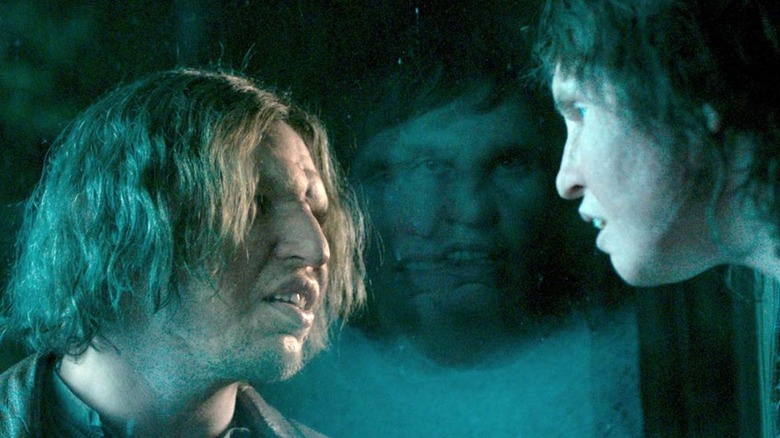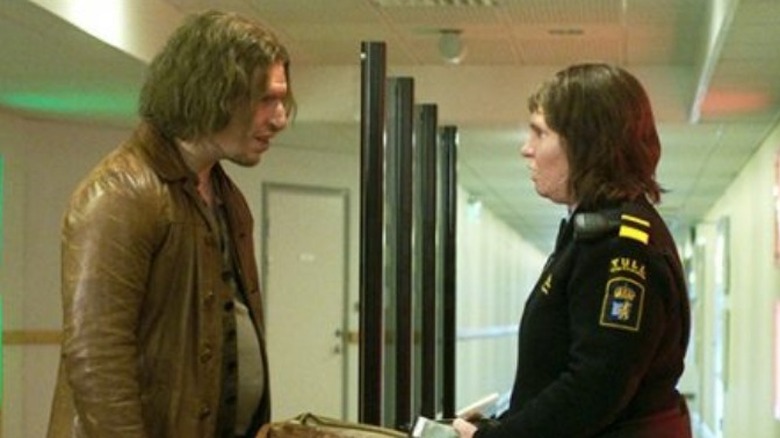'Border' Is The Year's Ugliest And Most Beautiful Movie [NYFF]
How our stories take shape is worth considering, especially the weird ones. Let the Right One In novelist John Ajvide Lindqvist helped bring his story to the screen in Tomas Alfredson's film of the same name — a tender vampire tale about belonging — a process he repeats for Ali Abbasi's Border based on his own short story. As one of three screenwriters on the film (along with Abbasi and Isabella Eklöf), Lindqvist is tasked with yet another transmutation of meaning through a genre lens. Border, a film ideally watched with little prior knowledge, is best described as the story of Swedish border agent Tina (Eva Melander), an ostensibly "ugly," Neanderthal woman with a literal sixth sense for crime, discovering the truth of her origins. Though in crafting a horror-adjacent tale in which European immigration is a constant backdrop without ever being a central focus — what is or isn't metaphorical becomes fittingly borderless — the very concept of "meaning" becomes a tightrope act.
Border, as relevant a film about "the now" as any, doubles as not only xenophobia metaphor, but an at-times crafty, at-times questionable transgender text as well. It's a lot of things rolled into one — Supernatural detective thriller! Fairy tale that touches on Western beauty standards! — and as with all art that hopes to spin multiple plates, its execution is imperfect. And yet, it remains viscerally compelling from start to finish, drawing the eye to its own imperfections and complications at every turn. /Film editor Jacob Hall calls it "a terrible idea executed with grace," and rightly so.
(This post contains some spoilers for Border, so if you want to return after the film opens in theaters on October 26, this is a good point to bookmark this post.)
Is it problematic, or poignant? These seemingly opposing forces are woven into its very fabric. Its character-centric text tells of the reserved, troll-like Tina, whose ability to smell fear, shame and guilt — emotions supposedly indicative of criminality — makes her the perfect watchdog for the EU's ports. She's able to sniff out a hidden memory card containing child pornography on a well-to-do businessman, but she's also part of the wide-spread problem of border authorities stopping migrants based on "suspicion." When the equally troll-ish though much more self-assured Vore (Eero Milonoff) passes through her post, Tina smells... something.
Vore has a pompous, eerie demeanor; his protruding brow and jagged teeth make him akin to the heavily made-up, bloodthirsty "races" of Harry Potter and The Lord of the Rings (your Orcs and the likes), though his pot-belly and muted, dadcore attire (untuck your t-shirt, dude) make him discernibly human. He carries larvae in a timed hatcher that, to the untrained eye, resembles a caricature of a dynamite bomb, a resemblance he knows full well will get him stopped at the border. If he truly feels any guilt or shame, he hides it well; he must be used to it, since he draws the stares of children and adults alike.
Tina insists that Vore be strip-searched — her supernatural sense of smell has never failed her — though the reason Vore might be fearful or shameful doesn't occur to her. Vore doesn't have the body of a cisgender man; he has what Tina's male coworker describes as a vagina, though he also bears a scar on his tailbone similar to Tina's. She apologizes profusely, familiar with the kind of embarrassment she must have caused Vore, but he simply shrugs it off. "Ugly" and creepy as he may be, gorging on all the salmon at minimalist buffets, there's something alluring about the way he carries himself. Were he better looking by Western and/or human standards, his leery stares would read like smolders.
Tina, a woman who looks over her shoulder at every turn, fearful of being insulted or attacked for her appearance, is drawn to Vore's confident sense of equilibrium. Raised by "normal" parents, as appearances go, Tina has never seen anyone else with her physical features, let alone the same scars caused by both surgery and lightning; the elements seem to chase them both. The two are clearly connected somehow, both by genetics and something more, and the mundanity of Tina's domestic life compels her to search for answers. Her live-in boyfriend, when he isn't off at out-of-town dog shows, crosses line after line in getting her to make love to him — Tina, who isn't able to have children or become aroused (by "regular" humans, at least), is understandably unwilling — whilst Vore seems to know what makes her tick, both in the way she sees the world and her yet-to-be-discovered physicality.
The two engage in a whirlwind affair, letting loose like animals in heat as they make love in forests and ponds, surrounded by a nature that's far more accepting of them than any human society. Even their awkward fumbles and wide-open-mouthed kisses glow with the beauty of mutual acceptance as the rain shields them from human hatred. Tina learns more about who she is, where she comes from and what her "normal" parents kept from her; Vore is her guide and window into a world of self-acceptance, and she noticeably places him on a pedestal. That is, until Vore's own crimes and intentions become clear; a man beaten down by the world, his survival in it isn't just dependent on illicit activity, but the kind with vast human collateral he doesn't seem to care about. To Vore, those who have wronged him — even innocent individuals who belong to oppressive groups — must suffer as he has. And Vore has certainly suffered, as has Tina. Would a violent rebellion necessarily be wrong?
Regardless of what side the film or the viewer comes down on, Abbasi presents a complex relationship that opens up new opportunities for Tina. She's able to understand her physical, social, sexual and cultural outsidership for the first time — the "metaphor" here is all-in-one, for better or worse; what Tina even is has a dozen real-world parallels — but she's also forced to deal with the pull and push of betrayal by loved ones for the first time, as she discovers both her parents' dark past as it pertains to her childhood, and Vore's equally sordid present.
Fantastical elements serving a dual purpose
Abbasi's matter-of-fact approach to the film's fantastical elements serves a dual purpose. It makes easier the accepting of this world, in which a humanoid creature like Tina can live as a human, but it also speaks to her assimilation into it. She spends time on her couch with dirtbag boyfriend, but she's forced to ignore the odd fact that his dogs seem especially scared of her. She shops at the grocery store just like anyone else, but she works overtime to ignore the concerned stares of the old women who shop there too. (The film also circumvents the Bright problem of an alternate history with unchanged specifics by simply tweaking existing forms of oppression and disinformation; Tina doesn't know where she came from because the violent, bigoted society we live in willed it so)
Abbasi, an Iranian-born Swede, no doubt has a unique perspective on outsidership in Europe. The world's current migrant crises often have Islamophobic hues, but by placing Tina in the unique position of both oppressor and oppressed, Abbasi circumvents any one-to-one racial comparisons that might prove to be issues in and of themselves. While he treats "race" as Tolkein did, a set of biological differences that give rise to sociological norms, Tina and Vore are still played by Caucasian actors, wherein most Western fantasy films would've made them darker in appearance. The metaphor, or rather metaphors, still exist no doubt; Tina is "ugly" by the same standards that deem white Europeans beautiful, and it's in the rediscovery of an entirely different set of norms that she's able to accept her value. On the other hand, the more indirect metaphors, like the film's transgender subtext, prove to be much thornier.
It's interesting to see a film that presents an alternate culture wherein gender norms don't fit rigid boxes as they do in most human societies — physically, Vore is able to get pregnant — though this apparent mis-alignment of genitalia and outward presentation exists as a byproduct of Tina and Vore (and whatever they are) being implicitly non-human, and being labelled from a human perspective. Perhaps calling Border a transgender text is a misnomer; while The Matrix conveys the unspoken subtleties of gender dysphoria ("You're here because you know something. What you know you can't explain, but you feel it. You've felt it your entire life, that there's something wrong with the world. You don't know what it is, but it's there, like a splinter in your mind, driving you mad"), Border's characters deal with physical un-belonging in more overt ways (they could be seen as Intersex, but this too requires a human view on something otherworldly) though none of these bodily issues ever correlate to anything resembling transgender experience. That Vore and Tina simply "are" is a comforting thought — detached from real-world specifics, their self-acceptance is beautiful — but their physical existence is explicitly rooted in transgender and intersex human experiences that the film seems to arrive at by accident.
The metaphor itself being somewhat borderless in a film so grounded in real-world oppression becomes shaky at this juncture. Whether by intent or happenstance, the specifics of Border end up feeling like mirror-versions of real-world racial and LGBTQ issues. But to what degree is a fantasy story, even one ostensibly "grounded" in contemporary identity politics, beholden to real-world specifics?
Questions of Gender
Is it a problem that Vore is played by a cisgender man? If he's meant to be a transgender character, certainly; Abbasi doesn't seem to think so, but an approach that chooses gender and sexuality as its partial focus, trades in its visual and spoken language, and then proceeds to blur its own metaphor makes this a complicated question, especially when Vore uses specific elements of his biological function in ways one might consider monstrous (without getting into specifics, a more critical approach toward this element may have required a third "troll" character's perspective, which would have made for an entirely different film). I'm willing to list Border alongside the dozens of other recent issues of casting cis actors as trans characters (Sacred Games, Rub & Tug, the list goes on) but ultimately, regardless of intent, this aspect of Border gets lost in the unending shuffle of barely-human transgender subtexts that, in 2018, ought to simply be transgender texts.
Does that make Border an ugly film? As it pertains to its muddled approach to gender, perhaps. It's certainly beautiful for a whole host of other reasons; for one, it articulates minority experience (albeit a nebulous, mish-mash minority, if we consider "the metaphor") in an indelibly soulful manner, presenting the discovery of one's own history and future with the requisite balance of pride and dread. Fittingly, however, it speaks to the very nature of beauty and ugliness as matters of perspective, forces in constant flux that don't necessarily cancel each other out. Tina's discoveries about herself and those around her follow an almost cyclical pattern. Every discovery of some new natural wonder is succeeded by the discovery of violence or evil, often in the same places, people and biological processes (again, I won't get into the specifics pre-release, but Border is a truly strange movie worth discovering) and every step takes Tina closer to something resembling physical and moral wholeness as she's able to recalibrate the way she sees the world.
Helped along by wonderful lead performances, which feel like they simultaneously complement and do battle with Göran Lundström's ingenious make-up, Border is a film that demands both reveling in and critically unpacking its every complicated moment. Being present to bask in the glow of what it offers — love, at times unconditional — comes with the added responsibility of understanding why getting swept up in an uncomfortable kiss or a hand caressing the flow of a river is an option in the first place.
What lies, what violence and what human evils make these simple moments such a beautiful reprieve? What failings must occur in the film's approach to the real so that its un-reality may shine? Few films bridge the gap between thinking and feeling with such finesse, but Border stands apart in every way imaginable, as a deeply troubling piece on human experience. Is it problematic? Yeah. Is it poignant? That too.


